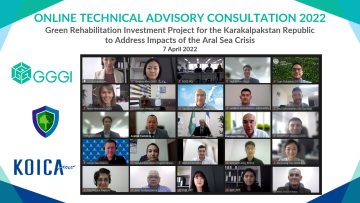
Tashkent, 7 April 2022 – The Global Green Growth Institute (GGGI) in Uzbekistan hosted a one day virtual Technical Advisory Consultation under the 'Green Rehabilitation Investment Project for Karakalpakstan Republic to address impacts of the Aral Sea crisis'. The Aral Sea GRIP has a 3 year duration (2021 - 2024), and a budget of USD 5.9m that is co-financed by the Korea International Cooperation Agency (KOICA) and GGGI. 16 government stakeholders, from key Ministries and national committees, and 29 development partners attended the consultation and provided invaluable feedback.
The consultation aimed at sharing four project deliverables that are under development, including the Climate Resilience Green Growth (CRGG) assessment, the Green Recovery Investment Analysis (GRIA), the Risk Profile on Disaster-Related Human Security, and the Risk Mitigation Capacity Building Curriculum Outline with key stakeholders; seeking their inputs to ground truth and gain validation of preliminary insights to address continuing information/data gaps.
Climate Resilience Green Growth (CRGG) assessment presents a cross-cutting analysis of the agriculture sector of Uzbekistan and Karakalpakstan by assessing the exposure, sensitivity, and adaptive capacity of the agricultural sector to both climate change and the Aral Sea dust impacts. Drawing upon a consultative process, the CRGG expects to contribute to the identification and prioritization of a realistic and effective green investment project pipeline.
Green Recovery Investment Analysis (GRIA) analyzes the potential impact of investments in three infrastructural adaptation measures for farm protection: namely, drip-irrigation systems and planting windbreaks for fruit orchards, greenhouses for vegetables. The GRIA provides a scenario-based assessment of both monetary and non-monetary benefits that may be realized under the current levels of investment, contrasted with the impacts given the government's targets for dissemination of these technologies in 4 target districts of Karakalpakstan, as well as potential for further scaling.
In addition, an overview of two deliverables that are aimed at diagnosing and supporting development needs for women, youth, and male farming stakeholders in 4 target districts of Karakalpakstan were presented. The risk profile for disaster-related human security is being developed to assess threats to livelihoods and health, and perceptions of environmental degradation and climate change, and feeds into the identification of the priority capacity development needs. Based on this risk assessment, integrated capacity-building programs are being developed to raise awareness of risks and enhance skills for agriculture-related adaptation/mitigation actions that can be taken by youth, women and men within stakeholders home and on their farms.
Dr. Jusipbek Kazbekov, Deputy Chairman of the State Committee for Ecology and Environment Protection (SCEEP) expressed his gratitude to GGGI Uzbekistan for organizing this timely consultation, which serves as a milestone to start dialogues and discussions among various partners. He also informed the participants that the SCEEP has been assigned to develop a 5 year Aral Sea Strategy to conserve the ecology and biodiversity and promote green growth in the region, and urged all partners to support the SCEEP in promoting innovative climate-smart technologies, creating green jobs and identifying climate-related Green Bond financing modalities.
Dr. Aaron Russell, Country Representative, encouraged participants’ active participation. He stated that “Once completed, key stakeholders will be invited for the validation of our final product for interventions in Karakalpakstan, tentatively in June this year.” Dr. Russell also expressed his appreciation to the SCEEP and the KOICA for their trusted partnership. Finally, he reaffirmed GGGI’s continued support and called for joint efforts for the development of a 5 year Aral Sea strategy, which will complement the priorities identified in the Ministry of Investment and Foreign Trade's "Aral Sea Integrated Roadmap", other key policy directives, and development targets set for sustainable development in the Aral Sea Region.
A series of in-person consultations will be organized for key Karakalpakstan Technical Advisory stakeholders of the Aral Sea GRIP project in the following week.
Key Documents
Climate-Resilient Green Growth Assessment (Draft) | РУССКИЙ
Green Recovery Investment Analysis (Draft) | РУССКИЙ
Concept of Capacity Building Modules (Draft) | РУССКИЙ
Risk Profile on Disaster-Related Human Security (Draft) | РУССКИЙ
Presentation Documents
Risk Profile and CB Modules Curriculum | РУССКИЙ
Reference Documents
GRIP Aral Sea Project Brief | РУССКИЙ
Business Development Platform Brief | РУССКИЙ
Insight Brief: Legal & Policy Review in Agriculture | РУССКИЙ
